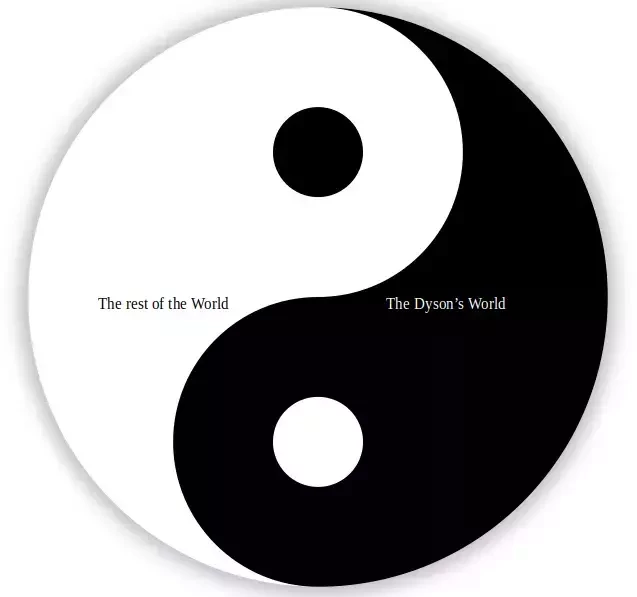Search
Items tagged with: Cosmogonic
Free Will
Forever Tag: #trondiasporapsycofr_1734394937
Free will can be defined as the capacity for self-control and the ability to repel control imposed by external forces, as established by the autopoiesis of human consciousness.
The wavy line in the middle is the event horizon. You must strive to move away from it by exercising your free will or you will inevitably fall into the Dyson's World.
1 Definition and Foundation of Free Will: This concept is closely associated with autopoiesis, understood as the ability of living systems to generate and sustain their own organization. Additionally, beings with self-awareness naturally tend toward a eupoietic state, which favors self-regulation and facilitates access to a suprasensory realm where transcendent values reside.
Thus, free will emerges as an inherent faculty of natural systems, fully realized when the necessary abilities to interact effectively with the suprasensory field are developed. Beyond sensory perception—inherent to natural systems—this heightened suprasensory perception leads to two realms: 1. the realm of ideas (metaphysics, philosophers), and 2. the realm of spirits (mysticism, Shamans).
2 Beings with Free Will: Not all beings are capable of exercising free will. Only those with self-perceptive consciousness possess the necessary conditions because:
They are autopoietic: Living within a system that sustains and regulates itself.
They are eupoietic: Evolving toward the fullness of their own consciousness.
They have suprasensory perception: Surpassing developmental stages, they reach a superior level of perception that connects with conceptual worlds, such as Mathematics (Plants and animals can't do that).
3 Scientific and Mystical Perspectives: The phenomenon of suprasensory perception and its relationship with free will can be explained from two main approaches:
A. Deterministic Neurosciences: In this perspective, hypotheses that deny the existence of free will prevail, positing that everything is determined or inevitable. From this viewpoint, the possibility of transcendence or mysticism is excluded.B. Mysticism of the Unmoved Mover
Free will is seen as an inherent property of consciousness, supporting the necessity of the Aristotelian Unmoved Mover. Some mystical perspectives, such as some versions of pantheism and, even the #Cosmogonic Fundamental Field perspective, can be adapted to avoid the existence of Free Will.
In both cases, the existence of complex structures like Mathematics seems to indicate a level of higher, suprasensory consciousness. While the rejection of free will by neuroscientists should be respected, it is unnecessary to accept their hypotheses as definitive of human capacities. We do what we can, and where we can, nihilistic hypotheses become unnecessary, particularly when direct evidence from mystical experiences is available.
4 Challenges to Exercising Free Will: Although all human consciousnesses are endowed with the ability to exercise free will, not all individuals succeed in doing so due to various obstacles or constraints that hinder its exercise:
Educational and cultural conditioning: Beliefs and norms that limit personal freedom.
Psychological trauma: Emotional wounds that make self-regulation difficult.
Addictions or chemical influences: Dependencies that alter perception and will.
Rigid scientific models: Some, especially within neuroscientific emergentism, dogmatically reject the possibility of a Creator, thereby denying a transcendental dimension of freedom.
5 Choosing the Realm of Consciousness: Free will implies that each individual must consciously choose the realm in which to develop their consciousness. This can be summarized in two archetypes:
Yin: Represents receptivity, intuition, and spirituality.
Yang: Represents activity, rationality, and physicality.
You cannot evade choosing one of these binary options, as it carries profound implications, defining the development of consciousness and granting purpose to existence. Unlike Socrates, who sought constant questioning of truth and freedom, here the practical choice resolves the dilemma: you act according to the logic you've adopted, whether metaphysical (natural hope) or experiential (sensory or transcendental)
If you evade, you nihilistically choose the black option: the Dyson's World
#notas #god #dios #dioses #mistic #mística #religion #culture #cultura #spirit #spiritual #espiritual #drogas #drugs #adiction #adicción #buda #budismo #buddhism #chaman #shaman #chamanismo #shamanism

Fredom vs Free Will
We must divide a confusing notion about freedom: 1. freedom as current possibilities to "follow" a given branch at a node, and 2. freedom as current ability to "choose" a given branch at the same node. A ball must have actual possibilities, but it cannot have faculty. At the same node, consciousness must have '1', and '2' may not be actual but potential (also, some people may have their faculties altered, i.e. hypnosis, hallucinations, terror, etc.)
Let's assume the simplest case, suppressing the potential and the altered state of consciousness: 1. freedom as current possibilities to "follow" a given branch at a node, and 2. freedom as current ability to "choose" a given branch at the same node.
The ball must follow any branch independently of the final result.On the contrary, consciousness can choose against its best option while being absolutely certain that option is the best. You can choose to die knowing that you enjoy life, you can continue enjoying it more and more, and that therefore it is in your best interest not to die. That is, you can choose to die for the hope of a greater good, which a ball, an animal, etc. can never do.
These things happens, then it is evident that the universe is not deterministic.
1. Freedom as Possibilities vs. Freedom as Choice
Possibilities: In the example, the ball has the possibility of following any branch, determined by external forces or chance, but it lacks any faculty to make a choice. Its trajectory is dictated entirely by physical laws or probabilities.
Choice: Consciousness, unlike the ball, not only possesses possibilities but also a capacity to deliberate, evaluate, and intentionally select a branch. This capacity for intentionality adds a layer beyond deterministic or random processes, affirming the non-deterministic nature of conscious action.2. Consciousness and Non-Determinism: Consciousness introduces an element of non-determinism because it can,
Choose contrary to its own interests: Consciousness could choose to die despite knowing that continuing to live would objectively maximize one's well-being.
Act based on hopes or values: Consciousness can behave beyond immediate physical outcomes, such as sacrificing oneself for a greater good (e.g., moral convictions, love, or spiritual beliefs).
This suggests that conscious agents are not constrained solely by deterministic causality (external forces) or randomness (lack of order). Consciousness can introduce teleological considerations (choices based on ends or goals that may even transcend the self).
>
3. Evidence of Non-Determinism: The example implies that the universe allows for actions driven by intentionality and meaning, which neither randomness nor determinism can fully explain:
>
A deterministic universe would make every decision preordained based on prior causes, eliminating true choice.A random universe might present possibilities, but it could not account for intentional selection (acting with purpose or agency).
Conclusion:
By this logic, the fact that conscious beings can make choices against their immediate well-being, driven by hope or principle, supports the claim that the universe is not entirely deterministic. Free will is demonstrated by inference.



